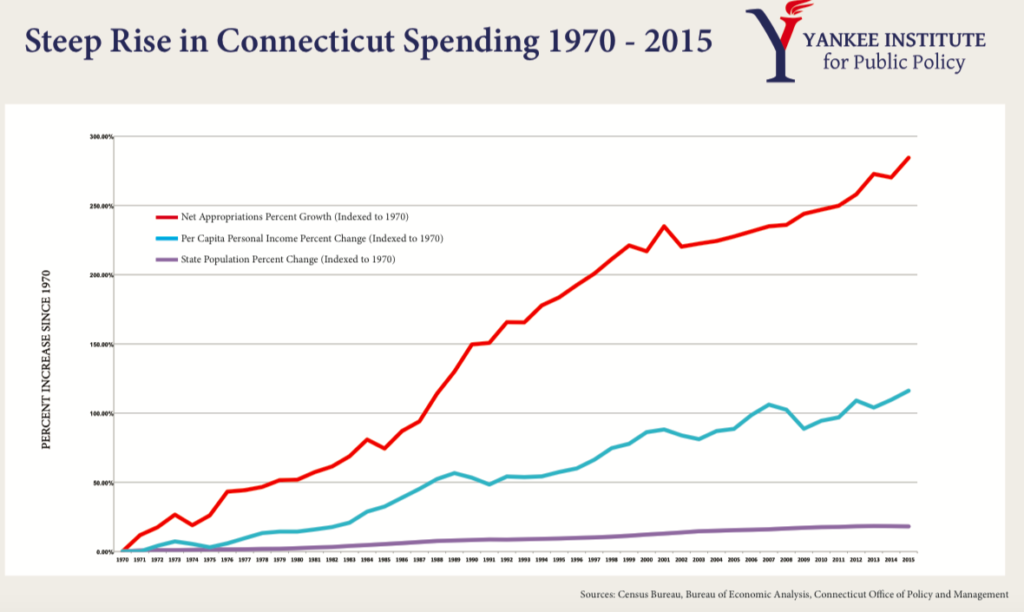Implicit in Governor Malloy’s announcement that “non-essential” state employees would now be designated “Level 2” employees is the recognition that government has only a few essential jobs, namely safety and security, roads and bridges.
Basically, government exists to ensure people can go about their lives in relative peace, unencumbered by roving bands of thieves, collapsing bridges or — as originally intended — government itself.
Most of Connecticut’s government employees don’t do that, hence all the jokes about non-essential employees who don’t have to work during snow-storms, prompting a non-essential executive order meant to signify that ALL government is essential in some way.
Government does some things well — namely, what government is supposed to do. Connecticut is fairly safe when it comes to crime. The roads get plowed during snowstorms. And, despite warnings from those who want to put electronic toll gantries in front of everyone’s driveway, the state’s roads and bridges aren’t crumbling.
All government suffers from inefficiencies but, in general, the job most people expect from state government — the essential part of government — gets done.
But then there’s the other part — the non-essential part of government, the newly designated Level 2 of government.
Level 2 government likes to pretend it is Level 1 government, such as cops and firefighters; that it exists to provide safety and security for people when, in reality, it is dedicated to ensuring the state exists for its own sake.
This is not about the non-essential employees, per se. Essential functions of government still need administrative staff and no one thinks that poor Frank from accounting needs to brave the terrifying Atomic Blizzard to crunch some payroll numbers. Frank is needed for those essential government functions, but not during an emergency.
This is about the part of Connecticut government which actually makes life more difficult for people and businesses.
For instance, the Connecticut Department of Labor wants to institute a minor payroll tax in order to fund its staff — literally $7.50 per year per employee which would generate about $9 million. Declining federal funding and rising fringe benefit costs for DOL employees means the agency will be in deficit.
The DOL is one of those regulatory agencies whose apparent purpose — other than administrating unemployment payments — is to be a thorn in the side of businesses.
Just ask Alan and Gerald Zordan who moved their company Borgeson Universal out of Connecticut. The owners gave a laundry list of regulatory burdens the state has imposed which contributed to their decision to leave, but held a special place in their hearts for the “mind-boggling” treatment they received from the DOL.
The agency also enjoys spending money, time and manpower trying to shakedown non-profit youth sports leagues for tax dollars. According to the DOL, a 15 year old kid who referees a weekend soccer team is an “employee” of the league necessitating payroll deductions.
The Soccer Club of Guilford was forced to designate a professional women’s soccer player an “employee” because she was nice enough to put on a weekend soccer clinic for the kids — all to collect a couple hundred bucks in taxes and fines, which certainly didn’t cover the cost of the DOL employee’s time.
DOL is essentially asking Connecticut businesses to subsidize the Level 2 state employees whose job it is to make Connecticut a more difficult place to operate a business and play soccer.
As of 2015, Level 2 Connecticut government had dreamed up 360 different sources of revenue — everything from income taxes to dog licenses are designed to separate individuals from their money and funnel it to the state.
Two hundred of those revenue sources generate .0015 percent of the state budget — approximately $29.6 million. Those minor revenue streams range from Jai Alai licensing fees to oyster ground taxes and a bunch of penalties for “failure to register.” All of these require Level 2 employees to administer, collect, investigate and enforce.

For perspective, Connecticut’s pension costs — enshrined for the foreseeable future in the SEBAC agreement — grew 8 times that amount between 2014 and 2016. Even a modest reform to that system could result in enough savings to eliminate all those licenses, fees, registrations and penalties.
But Level 2 government is not interested in fixing the pension system any more than it’s interested in fixing the regulatory system. Both serve to perpetuate the existence and growth of state government, not the existence and growth of state residents.
The costs rise, necessitating more tax revenue; the regulations increase, necessitating more Level 2 employees to monitor and enforce.
When Connecticut lawmakers put forward bills to lower regulatory burdens on people and businesses, or reform ballooning pension costs, the Level 2 state is there to push back.
They do so in the name of safety and security, because the licensing fee to “breed, sell or possess specific species of wild birds” is vital for the sake of society, and social order can only be preserved by ensuring a 15-year-old weekend soccer referee has unemployment taxes (which she can never claim) deducted from her paycheck.
The Level 2 designation may just be a change in semantics, but the idea that ALL government is in some form essential serves only the state, not the people.

